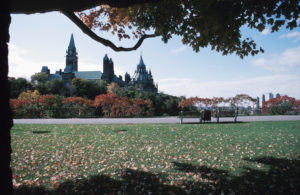The Faults in Our Systems: How COVID Has Exposed Canada’s Outdated Ways
Senator Ratna Omidvar and Andreas Souvaliotis discuss how the COVID-19 pandemic has exposed the flaws in Canada’s decentralized federation.

A crisis is a terrible thing to waste.
That phrase, made famous 12 years ago by the Barack Obama administration in the U.S., so simply reflects our nature as a curious, learning species. We don’t like to just patch things when they break; we love figuring out why something broke so we can build better for the future.
Naturally, kitchen-table conversations across Canada this year have been filled with passionate reflections on our ongoing fight against the pandemic. How are we doing? What are we learning about ourselves, our society, and our systems?
Canadians have been generally pleased with our government’s response. Our national wealth and sophisticated social setup helped shield us from most of the painful disruptions we saw elsewhere in the world. We did, however, take stock of all the things that need fixing, from broken long-term care homes to a lack of basic pandemic preparedness. And we also seemed to consider some important higher-plateau lessons about the everyday role of government, our freedom to borrow during an emergency, and the role of science in guiding public policy.
But one of our chronic challenges has been mostly left untouched during our COVID-era kitchen-table debates, even though our perpetual complaining about its symptoms seems to be one of our favourite national pastimes. Many Canadians in different corners of our country were frustrated again this year by the uncoordinated response between our different levels of government. The overlaps, the messaging confusion, and the contradictions — they all felt so predictable, so obvious, and so annoying.
The symptoms might have been more obvious and intense during the pandemic, but they’re not new. Canadians have always understood the shortcomings of our uniquely decentralized federation. We have always complained about all the duplication, the waste, the lack of agility, and those often meaningless, arbitrary boundaries between us. We have always felt a bit embarrassed when others gently mock us, as the New York Times did again this summer, for the anachronistic and comical trade barriers we still allow between our very own provinces. But we have also always seemed resigned to an unspoken conviction that our systems of governance are sacrosanct and should never be questioned or challenged.
Our beautiful democracy, with all its unique layers and intricacies, was designed more than a century and a half ago. Back then, in that vast new country, it was perfectly reasonable for two kids growing up half a world apart in North Bay, Ont., and Kamloops, B.C., to be nurtured by two very different provincial education systems. Today, however, in our modern and overwhelmingly urbanized nation, two kids living in those two small Canadian towns would have much more in common with each other than they would with a kid growing up down the road in Toronto or Vancouver.
Today, the real forces that bind us and materially affect our everyday lives are our home in Canada and our homes in towns, cities and communities. Those are the two real gravitational poles for us, because those are the real jurisdictional boundaries that really affect our modern-day lives and identities. The looseness of our federation, the layering of systems and taxes and health departments, the fines for carrying beer across invisible provincial borders — that’s just mildly annoying background noise in our lives. We get where it all comes from, we’re used to it — or perhaps slightly numbed by it — and maybe we’re too polite, too Canadian to challenge it.
Let’s not allow our Canadian politeness to stand in the way of constantly modernizing the way we govern ourselves. Let’s not be afraid to ask ourselves truly uncomfortable questions: Could we have saved even more lives during the pandemic if all our public-health messaging came from a single, national source? Do we benefit anymore from having 13 different health-care and education systems? Can we ensure better coordination to achieve reasonable shared standards with accountability? Why are we the only developed country that still doesn’t have one national securities regulator? How do we justify having interprovincial trade barriers in the year 2020? Is our quest for reconciliation with our Indigenous People supported or hindered by the way our federation works today? Why are fisheries and forests under federal jurisdiction? What about a seat at the table for large metropolitan areas?
Let’s not be afraid to always question and rethink the way we govern ourselves as a modern nation — even when that stretches us beyond our polite Canadian comfort zone.
Read the op-ed on the iPolitics website